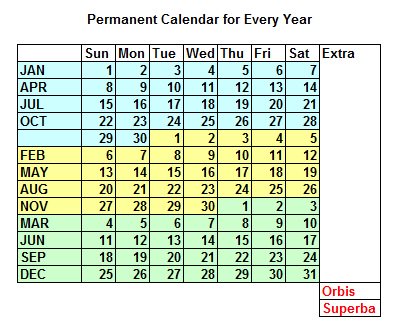April, June, and November.
Thirty-one hath all the rest,
Except for February clear which has 28 and 29 in a leap year
This is how I'm sure how most of us remember how many days are in each month - a poem. Not only that, a poem which doesn't even scan all that well.
Another way would be to look at your knuckles. Starting with your left hand, every knuckle is a month of 31 days; every valley between then is a month of 30 days. This even takes account of the fact that July and August which are consecutive, both have 31 days. Run out of knuckles? Just move onto your right hand.
The calendar has always seemed to me to be a thing, which is the result of accident, was obviously never designed and is quite frankly, nuttier than a bag of nuts, Brazil, Wal, Pea and M5 Hex. The only people that I can think who benefit from its continued use are calendar printers and the dead pope Gregory XIII and Julius Caesar, who are credited with trying to sort out the calendar.
There needs to be someone to finally sort out the mess once and for all. All of this is enough to drive a sane person crazy, or a crazy person to science. I am that crazy person that the world needs.
Game Over.
Unlike the International Fixed Calendar as invented by Moses B. Cotsworth and used by Kodak for
61 years¹, my calendar has 12 months as per normal and in addition to that, every quarter is identical.
Every quarter would be precisely 91 days long, which is 13 weeks. This is incredibly useful for accounting purposes because having every singe quarter an identical length of time, removes those small variations which are caused by the quarters currently having different lengths.
You will note the addition of two extra days in the bottom right hand corner. I have called these Orbis and Superba. Like Cotsworth's Year Day and Leap Day, these two days would either occur as New Years' Day but not in any month or week or as New Years' Eve.
Let's be honest, nobody wants to work on New Years' Day as it is and an additional day which would immediately follow once every four years, instead of adding it into February of all places (Why does it only have 28 days? Who was the nuff-nuff who thought that one up?) it would be added to that space between December and January.
Orbis is a good name for that extra day because it marks the arbitrary point in the year where we make one orbit of the sun, and Superba is called that because it is an extra, a bonus day.
I do realise that this confines people's birthdays permanently to the same day every year but people who were born on some dates which are always holidays, like Anzac Day for example, always get a public holiday on their birthdays anyway. If peoples' birthdays are what we're worried about, surely people can just learn to tolerate it. If the people who currently have their birthday on February 29 still want to remain mysterious, then they can choose to celebrate it on Superba. Whatever.
This idea is hardly new at all. Elisabeth Achelis founded The World Calendar Association in 1930 and proposed a calendar to this which is based on exactly the same principles, except that she proposed that the 31-day month be the first and not the third in the quarter. Issac Asimov's World Season Calendar was also for four 91-day quarters but he proposed that they be labelled A, B, C & D (May 10 would be B-40 for instance).
I would of course be stark raving bonkers to think that anyone would seriously adopt a calendar like this because even though the current calendar is an illogical mess, no-one can be bothered to change it.
... and because once every four years or so, I get to write a post like this which says exactly the same thing because some things never change.
¹https://en.wikipedia.org/wiki/International_Fixed_Calendar


No comments:
Post a Comment